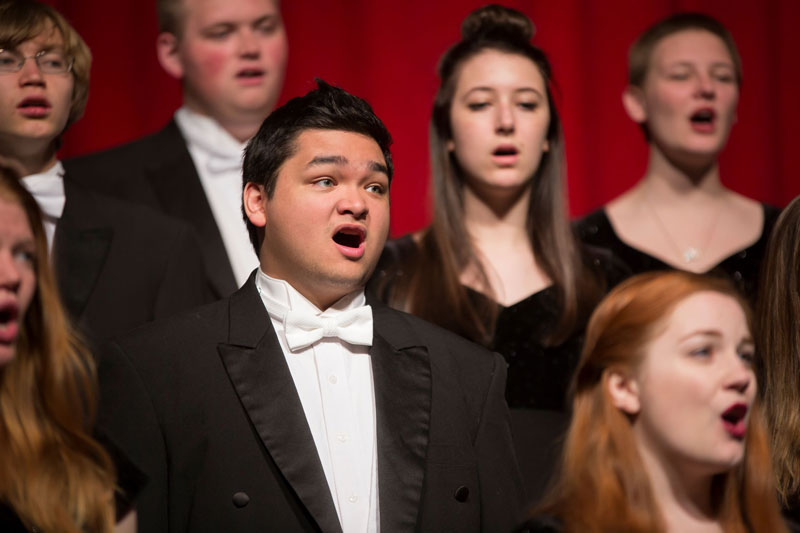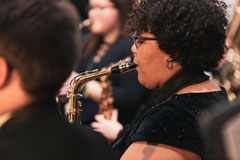
Majors find success, while ensembles enrich entire University
Members of Manchester’s music faculty aren’t inclined to sing their own praises or toot their own horns.
If they were, they might say that they have exceptional success preparing their students for graduate schools and careers and enriching the entire University community – music majors and non-majors alike. They do it all with a 70-year-old Winger Hall that no longer meets the needs of their dynamic department.
 By measure of the fewer than 20 students who are majoring in music, the department is small. But it is very wide-ranging, offering majors in music education, instrumental performance, vocal performance, theory-composition, and general music. It also fields a range of ensembles open to students across the University – A Cappella Choir, Symphonic Band, Manchester Symphony Orchestra (MSO), Spartan Pride Marching Band, Theater, Chamber Singers, Jazz Ensemble, Cantabile (women’s chorus), Manchester Symphony Chorus, Gold and Black Attack (basketball pep band), Percussion Ensemble, String Ensemble, and Oak Leaf Brass.
By measure of the fewer than 20 students who are majoring in music, the department is small. But it is very wide-ranging, offering majors in music education, instrumental performance, vocal performance, theory-composition, and general music. It also fields a range of ensembles open to students across the University – A Cappella Choir, Symphonic Band, Manchester Symphony Orchestra (MSO), Spartan Pride Marching Band, Theater, Chamber Singers, Jazz Ensemble, Cantabile (women’s chorus), Manchester Symphony Chorus, Gold and Black Attack (basketball pep band), Percussion Ensemble, String Ensemble, and Oak Leaf Brass.
It’s a formidable lineup and a heavy lift for only four full-time faculty members – Professor Debra Lynn (choral organizations and vocal studies; MSO conductor), Professor Tim Reed (theory and composition), Associate Professor Scott Humphries (bands and music education) and Assistant Professor Pamela Haynes (piano studies).
“Our primary function is to educate music majors and minors,” says Lynn, whose personal voice studio has a 100 percent placement in graduate school or employment. Her graduates place very high in graduate school entrance exams, too.
“One of the reasons that we are this successful is that we are small,” says Lynn, who is also department chair. “There aren’t 120 of them. They get a lot of personal attention from our small faculty. We’re really a family.”
The department’s vocal ensembles, in particular, attract a wide range of students. “When we recruit students, we’re not only recruiting for our own department, we are recruiting for the whole University,” adds Lynn. “There are many students who choose to come to Manchester because they can participate in an ensemble and be an athlete,” she adds.
Lynn and Humphries don’t want any student to have to choose between sports and music, for example. “It’s a wonderful manifestation of our liberal arts goals and our values about the liberal arts,” she continues. “The students are supposed to be discovering what they love here. We need to be allowing them that space to explore.”
Whether a student is a music major or not, Lynn says that participating in a music ensemble creates a more well-rounded college experience. “It gets them out of the lab or out of their textbooks and generate something really creative,” she adds. “Our alumni will tell you that when they look back on their years at Manchester, if they were in a music ensemble, it was one of the high points for them.”
Sometimes, the experiences even extend beyond graduation. Lynn will conduct her oratorio, “A Family Portrait,” at New York’s Carnegie Hall in May. MU’s A Cappella Choir, its alumni and friends, will be among the performers.
For his part, Humphries has completed his second season directing the Spartan Pride Marching Band, MU’s first marching band since the mid-1960s.
Spartan Pride is a relatively small band with a big sound. “They sound great. They sound fantastic,” Humphries said several weeks into the season. “I’m really proud of them.” The band has performed at MU’s home football games and at several area high school games.
Faculty believe that MU’s ensembles could be even stronger if it weren’t for Winger’s considerable limitations. Many prospective students have better facilities in their high schools, says Lynn, so the 1952 building is not a recruitment draw.
The original south portion of the building does not have central air conditioning, and heating from steam boilers is uneven. Students must carry instruments, which are stored in Winger, to Cordier for rehearsals and performances. “We don’t have anything that’s climate controlled for the storage of instruments and that’s really bad for them,” says Humphries, adding that mold has ruined some instruments stored in the Winger basement.
The music department lacks adequate practice, studio and rehearsal space. There is no soundproofing in the building, even in the practice rooms and recording studio.
“Music study is more about the mistakes you make and how you correct them than it is about perfection,” says Lynn. Students should be able to practice without being self-conscious of what other people hear. “Your practice time is sacred,” she adds. “The part nobody sees, which is 90 percent of their job – they’re really stifled at that. And that breaks my heart.”
Other department needs include:
- Adequate (and climate-controlled) storage for music libraries
- A choir rehearsal room with chairs so that students don’t have to stand for the entire period
- Rehearsal space for all University bands and the MSO
- Secure instrument storage in Cordier that is accessible to music majors and minors every day
- More studio and office space to accommodate the department’s many adjuncts who give music lessons
- A keyboard lab so that Haynes can teach piano to multiple students in a classroom setting
- A computer lab with better technical capabilities
Ideally, MU’s music program would have a performing arts center or at least an addition to Cordier Auditorium.
Lynn acknowledges that facilities aren’t everything. “The people are what make us great. But our greatness would be more obvious to others if we had better facilities.”
Humphries contends that Manchester’s Music Department is the best-kept secret around, and Lynn agrees. “We could so easily be a flagship program for Manchester.”
But the ones who choose to enroll at Manchester “come here because of the people,” she says. “They meet the faculty. They meet the students.”
“We’ve done some remarkable things in spite of our facilities,” she adds. “I think when the time comes for us to have an upgrade, we already have a wonderful foundation.”